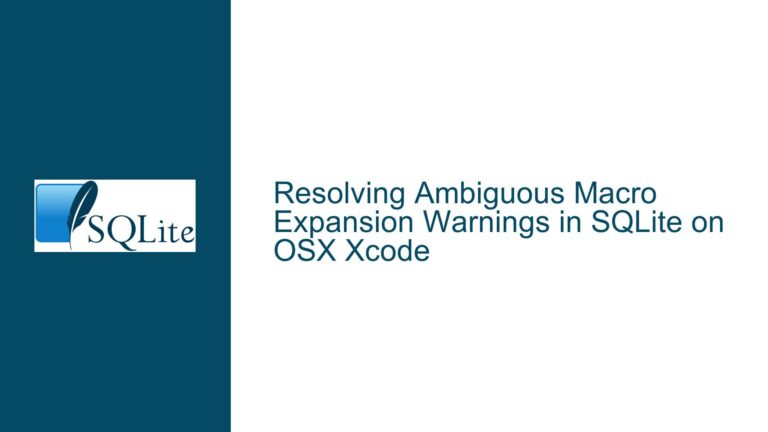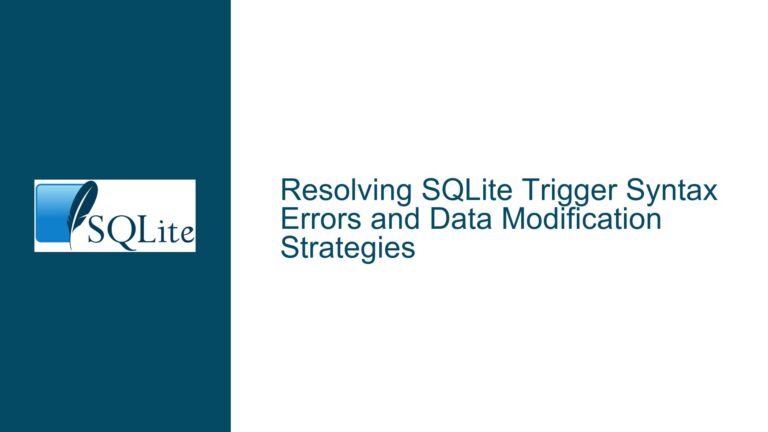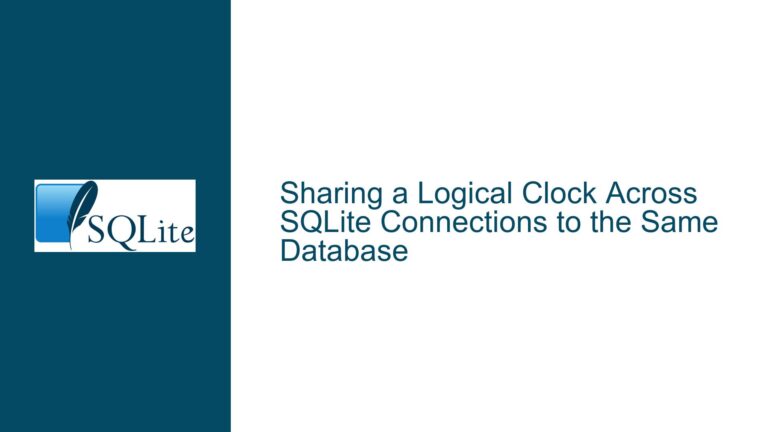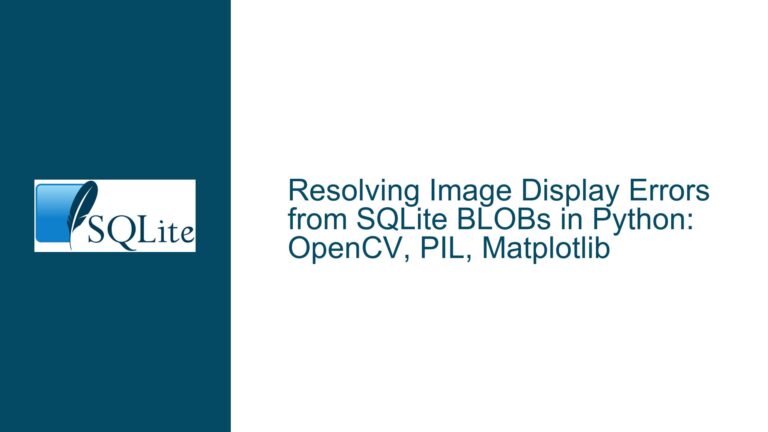Tiny C99-ism in SQLite3.c Breaks C89 Build Compatibility
SQLite3.c Compilation Error Due to Mixed Declarations and Code
The core issue revolves around a compilation error encountered when attempting to build SQLite3 using the C89 standard. The error message specifically points to a violation of the ISO C90 (commonly referred to as C89) standard, which prohibits mixed declarations and code within a function. The error occurs in the sqlite3ExpandReturning function within the sqlite3.c file, where a variable declaration (Expr *pNewExpr) is placed after executable code within the same block.
The error message is as follows:
sqlite3.c: In function ‘sqlite3ExpandReturning’:
sqlite3.c:138692:9: error: ISO C90 forbids mixed declarations and code [-Werror=declaration-after-statement]
138692 | Expr *pNewExpr = sqlite3Expr(db, TK_ID, pTab->aCol[jj].zName);
| ^~~~
cc1: all warnings being treated as errors
This error is significant because it prevents the successful compilation of SQLite3 in environments that strictly adhere to the C89 standard. The issue is particularly relevant for developers working with older compilers or platforms that do not support the C99 standard, which allows mixed declarations and code. The error highlights a compatibility problem that can disrupt builds in legacy systems or environments where upgrading to a newer C standard is not feasible.
The relevant code snippet from sqlite3.c is:
int jj;
for(jj=0; jj<pTab->nCol; jj++){
if( IsHiddenColumn(pTab->aCol+jj) ) continue;
Expr *pNewExpr = sqlite3Expr(db, TK_ID, pTab->aCol[jj].zName);
pNew = sqlite3ExprListAppend(pParse, pNew, pNewExpr);
if( !db->mallocFailed ){
struct ExprList_item *pItem = &pNew->a[pNew->nExpr-1];
}
}
The declaration of Expr *pNewExpr is placed after the if statement, which is a violation of the C89 standard. This issue is not just a theoretical concern but has practical implications for developers who rely on C89 compatibility, especially in environments where upgrading to C99 is not an option.
Interrupted Write Operations Leading to Index Corruption
The root cause of this compilation error lies in the use of C99-specific features within the SQLite3 codebase, specifically the ability to mix variable declarations with executable code. While this feature is allowed in C99 and later standards, it is explicitly prohibited in C89. The error is triggered because the code in sqlite3ExpandReturning uses a C99-style variable declaration after an executable statement, which is not permissible under the C89 standard.
The C89 standard requires that all variable declarations within a block must appear at the beginning of the block, before any executable statements. This requirement is relaxed in C99, allowing developers to declare variables anywhere within a block, as long as the declaration precedes the first use of the variable. The SQLite3 codebase, while generally maintaining broad compatibility, occasionally includes C99-specific features that can cause issues when building with strict C89 compilers.
The specific line causing the error is:
Expr *pNewExpr = sqlite3Expr(db, TK_ID, pTab->aCol[jj].zName);
Here, Expr *pNewExpr is declared after the if statement, which is a violation of the C89 standard. This issue is compounded by the fact that the build process treats all warnings as errors (-Werror), causing the compilation to fail even if the code would otherwise be functionally correct.
The use of C99 features in SQLite3 is not inherently problematic, as most modern compilers support C99 and later standards. However, the SQLite3 project aims to maintain compatibility with a wide range of compilers and platforms, including those that only support C89. This commitment to backward compatibility is a key factor in the widespread adoption of SQLite3, but it also means that occasional issues like this one can arise when C99-specific features inadvertently make their way into the codebase.
Implementing PRAGMA journal_mode and Database Backup
To resolve the compilation error and restore C89 compatibility, the SQLite3 development team implemented a minimal change to the code. The fix involved moving the declaration of Expr *pNewExpr to the beginning of the block, ensuring compliance with the C89 standard. The modified code snippet is as follows:
int jj;
Expr *pNewExpr; // Declaration moved to the beginning of the block
for(jj=0; jj<pTab->nCol; jj++){
if( IsHiddenColumn(pTab->aCol+jj) ) continue;
pNewExpr = sqlite3Expr(db, TK_ID, pTab->aCol[jj].zName);
pNew = sqlite3ExprListAppend(pParse, pNew, pNewExpr);
if( !db->mallocFailed ){
struct ExprList_item *pItem = &pNew->a[pNew->nExpr-1];
}
}
By moving the declaration of Expr *pNewExpr to the beginning of the block, the code now adheres to the C89 standard, allowing it to compile successfully in environments that do not support C99. This change is minimal and does not affect the functionality of the code, ensuring that the behavior of sqlite3ExpandReturning remains unchanged.
The fix was committed to the SQLite3 source repository shortly after the issue was reported, demonstrating the responsiveness of the SQLite3 development team to compatibility issues. The commit can be viewed here.
For developers encountering similar issues, the following steps can be taken to ensure C89 compatibility:
Review the Code for C99-Specific Features: When building SQLite3 or any other C-based project with strict C89 compliance, review the code for any C99-specific features, such as mixed declarations and code, variable-length arrays, or single-line comments (
//). These features are not supported in C89 and will cause compilation errors.Modify the Code to Comply with C89: If C99-specific features are found, modify the code to comply with the C89 standard. This typically involves moving variable declarations to the beginning of blocks, replacing single-line comments with multi-line comments (
/* ... */), and avoiding other C99-specific constructs.Test the Modified Code: After making the necessary changes, test the modified code to ensure that it compiles successfully and functions correctly. This may involve running the build process in a C89-compliant environment and verifying that the resulting binary behaves as expected.
Submit a Patch to the Project Maintainers: If the issue is found in an open-source project like SQLite3, consider submitting a patch to the project maintainers. This helps ensure that the fix is incorporated into future releases, benefiting other developers who may encounter the same issue.
By following these steps, developers can address C89 compatibility issues and ensure that their code builds successfully in a wide range of environments. The SQLite3 project’s commitment to backward compatibility serves as a model for other projects, demonstrating the importance of maintaining support for older standards while still leveraging the benefits of newer language features.
In conclusion, the compilation error caused by a C99-specific feature in the SQLite3 codebase highlights the challenges of maintaining compatibility across different C standards. By understanding the root cause of the issue and implementing the appropriate fixes, developers can ensure that their code remains compatible with older compilers and platforms, while still benefiting from the advancements in the C language. The SQLite3 project’s quick response to this issue underscores the importance of community involvement and the value of maintaining backward compatibility in widely-used software projects.






